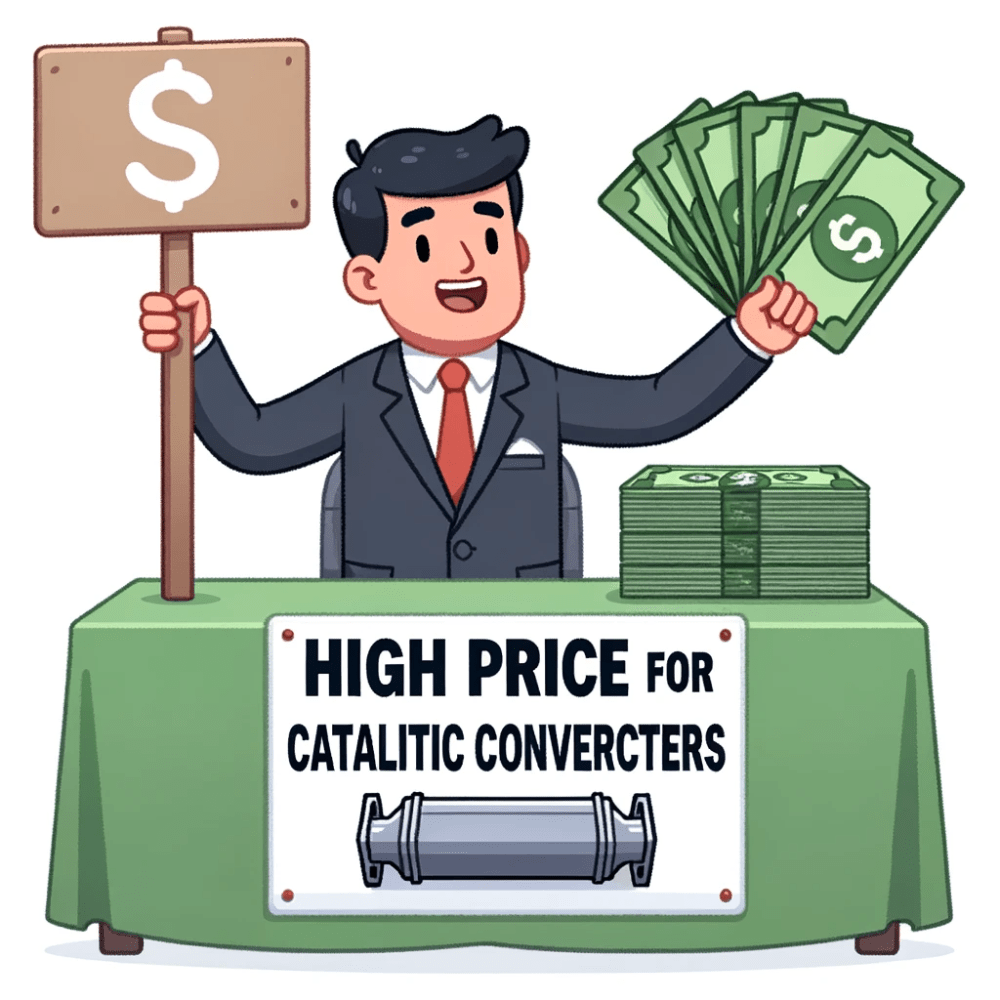
Why do scrap yards pay so much for catalytic converters? It’s a question that might have crossed your mind if you’ve ever wondered about the value of those mysterious metal boxes under your car. Well, the answer is simpler than you might think.
In this article, we’ll uncover the fascinating reasons behind scrap yards offering high prices for catalytic converters. From their vital role in cleaning up our environment to the hidden treasures of precious metals inside, you’ll soon understand why these car parts are in such demand. So, let’s dive into the world of catalytic converters and discover what makes them so valuable to scrap yards in plain, everyday terms.
The Role of Catalytic Converters
Catalytic converters, those metal canisters beneath your car, play a critical role in our vehicles and the environment.
Basic Function: They work like automotive alchemists, transforming harmful gases from your car’s engine into less harmful ones. By doing so, they help your vehicle run cleaner and more efficiently.
Reducing Emissions: In simpler terms, they’re the eco-friendly heroes that reduce harmful gases like carbon monoxide and nitrogen oxides, making sure our air stays clean and healthy. Catalytic converters are like the planet’s silent cleanup crew, making our skies clearer, one car ride at a time.
Precious Metals in Catalytic Converters
Catalytic converters, those hidden car components, hold a secret worth uncovering. Inside these unassuming boxes are precious metals like platinum, palladium, and rhodium. These metals play a crucial role in making catalytic converters valuable. They act like eco-friendly superheroes, helping to clean up the harmful stuff in car emissions. Moreover, these metals are quite rare, which adds to their value. So, the next time you wonder why scrap yards pay well for catalytic converters, remember it’s all about the treasure within – those precious metals that make our environment cleaner and your wallet a bit heavier.
Australia’s Environmental Regulations
Australia’s commitment to a cleaner environment is reflected in its stringent environmental regulations and emission standards. These rules are in place to ensure that we all breathe cleaner air and enjoy a healthier planet.
Environmental regulations and emission standards:
Australia has set some very strict rules to make sure we take good care of our environment. These regulations set limits on the amount of pollution that cars and factories can produce.
The role of catalytic converters in meeting these standards:
Catalytic converters play a vital role in helping cars follow these rules. They’re like the cleanup crew inside your car’s exhaust system, making sure harmful gases are turned into less harmful ones. This helps us all breathe fresher air and keeps us in line with Australia’s strict environmental standards.
High Demand for Precious Metals
The demand for precious metals plays a significant role in the value of catalytic converters. Here’s why:
- Precious metals like platinum, palladium, and rhodium are in high demand worldwide. These metals are used not only in catalytic converters but also in various industries, including jewellery, electronics, and more. As a result, the global demand for these metals drives up their prices, making catalytic converters more valuable to scrap yards.
- Economic conditions also influence the demand for precious metals. When the economy is strong, industries consume more of these metals for production, which can lead to higher prices for catalytic converters. Conversely, during economic downturns, demand may decrease, affecting the value of these converters. So, economic factors are a key player in determining how much scrap yards are willing to pay for catalytic converters.
Recycling and Reuse
Catalytic converters might seem like old car parts, but they hold a secret power: recycling. Why is this so important? Well, recycling catalytic converters keeps harmful materials out of our environment, making the air we breathe cleaner and safer.
Scrap yards are the heroes in this story not online scrap yards but also services like old car removal services. They collect these converters and work their magic, recycling them to create new products. It’s not just about earning money; it’s about making the Earth a better place. So, when you see a scrap yard, know that they are doing their part, making sure these converters find new life and purpose.
Scrap Yards and the Value Chain
Ever wondered how scrap yards turn old car parts into cash? Let’s break it down. Scrap yards play a crucial role in our environment by collecting and processing catalytic converters. They act like recycling heroes, gathering these parts from old cars. But how do they decide how much to pay for them? Well, scrap yards carefully check the condition and purity of the catalytic converters. Based on this assessment, they determine fair prices. So, these yards not only clean up our surroundings but also make sure you get a good deal for your old car parts!
Scrap yards in Australia often request sellers to provide a ‘Notice of Disposal‘ as part of the documentation process, ensuring compliance with legal requirements and enabling the seamless tracking of catalytic converters as they move through the recycling value chain.
Competitive Market Forces
Competition among scrap yards plays a significant role in the pricing of catalytic converters. It affects the value of these car parts in several ways:
Price Impact: When multiple scrap yards are vying for catalytic converters, they tend to offer competitive prices. This means that they’ll often pay more to attract sellers.
Customer Choices: Your choices matter too. You can choose where to sell your catalytic converter, and this decision influences the price you receive. Scrap yards are well aware of this, so they aim to provide better offers to win your business.
In simpler terms, the competition among scrap yards pushes them to pay higher prices for catalytic converters to attract sellers like you. Your choice of where to sell also gives you some power in determining how much you’ll get for these valuable car parts.
Factors Influencing Prices
The prices that scrap yards offer for catalytic converters are influenced by a variety of factors. Let’s break it down:
Catalytic Converter Condition: The condition of the catalytic converter plays a big role. If it’s in good shape, with no damage or excessive wear, it’s likely to fetch a higher price.
Metal Purity: The amount of precious metals like platinum, palladium, and rhodium inside the converter matters. The more of these metals, the better the price you can get.
Market Fluctuations: Prices can change due to market demand and supply. If the demand for precious metals goes up, so does the price of your catalytic converter.
Understanding these factors can help you get the most value when selling your catalytic converter to a scrap yard.
Conclusion
In conclusion, scrap yards offer high prices for catalytic converters in Australia due to the valuable precious metals they contain, stringent environmental regulations, and the global demand for these metals. Recycling and competitive market forces also play a significant role in determining the prices. Selling catalytic converters to scrap yards not only benefits the environment but can also be a financially rewarding choice for individuals and businesses.



